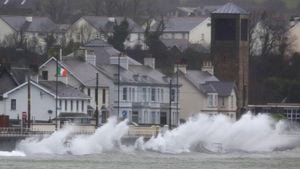Massive protests erupted across Slovakia on January 24, 2024, against Prime Minister Robert Fico’s controversial government, particularly his pro-Russian policies. The demonstrations, predominantly organized by the civic initiative "Mier Ukrajine" and various opposition political parties, were seen as one of the largest movements in modern Slovak history, with estimates of over 100,000 people participating nationwide. The most significant turnout occurred in Bratislava, where around 60,000 demonstrators gathered under the rallying cry "Slovakia is Europe", expressing their dissatisfaction with the government’s direction.
The opposition has been vocal against Fico’s administration, citing inflation, economic hardship, and healthcare as key issues driving public discontent. The protests have not only manifested within Slovakia but have spilled over to cities like Warsaw, Prague, Berlin, and Dublin, showcasing solidarity among concerned Slovak expatriates and allies. Notable public opposition to Fico's policies emerged following his December 2023 visit to Moscow, with many critics viewing his actions as detrimental to Slovakia’s ties with European allies.
Local reports indicated the protests began peacefully, yet they were met with heightened police security aimed at ensuring safety for all participants. Authorities emphasized the importance of following safety protocols, acknowledging the potential for unrest associated with large gatherings. Interestingly, smaller counter-protests emerged simultaneously under the slogan "Slovakia is not Ukraine," albeit attracting only around 40 participants.
Fico's rhetoric has become increasingly controversial as he claimed, without evidence, the presence of foreign experts attempting to orchestrate state destabilization. He alleged these individuals had connections to previous "color revolutions" and insisted they could exploit protests to overthrow the government. Such claims have led to accusations from the opposition of fear-mongering and limiting civic expression.
During the rally, demonstrators voiced their demands for Fico’s resignation as they criticized his perceived negligence of domestic concerns. The situation reflects deepening societal divides, with the opposition's previous attempts to initiate votes of no confidence facing setbacks amid fears of provoking unrest.
Fico, responding to the protests, maintained his stance by reiteratively condemning the opposition as conspirators seeking chaos and accused them of planning disturbances akin to Ukraine’s past uprisings. He warned against their agenda, insinuated coordination with foreign entities, and cautioned against potential disruptions to public order.
The demonstrators, asserting their right to protest, dismissed Fico's alarming narrative about impending violence and reiterated their grievances, stressing dissatisfaction with government policies impacting everyday life. “Despite officials’ intimidation claims of violence and provocation, all gatherings occurred peacefully and respectfully,” stated leaders of "Mier Ukrajine".
Simultaneous protests demanded reform and transparency within the government, with several participants condemning Fico's refusal to address pressing local issues, instead engaging with authoritarian regimes globally. Fico previously ignited outrage by dismissing Ukraine’s right to transit Russian gas through its territory, framing such actions as detrimental to Slovakia's energy interests.
Emphasizing the political climate’s instability, Slovakian intelligence agencies reported receiving intelligence about organized groups allegedly disrupting the peace and even called for deportations of foreigners involved. The situation escalated dramatically as both sides prepared for potential confrontations, adding urgency to public discourse around governance and civic freedom.
Fico's narrative of pursuing peace negotiations with Russia stood at odds with the opposition's view, which frames his actions as turning Slovakia away from European values and solidarity. The lack of support for his foreign policy among citizens has underscored the national debate on identity and democratic integrity.
The protests are indicative of broader European sentiments reflecting anxieties about national leadership amid geopolitical instability, mirroring similar movements seen across neighboring countries. The responses from law enforcement and government leaders have heightened public scrutiny of both domestic policy and international relations.
Despite maintaining his claims of orchestrated external meddling, Fico and his supporters face significant challenges as the protests signify entrenched dissatisfaction among Slovaks. Dedicated efforts from opposition parties continue to call for accountability and reform amid rising tensions, placing Fico’s administration under considerable pressure.
With both the public and opposition firmly resisting Fico’s administration, the upcoming days will be pivotal for governance and the prospects of stability within the region. The peaceful nature of the protests, coupled with significant turnout, reflects the citizens' determination to voice their discontent and demand change, highlighting the vibrancy of civil society and democratic engagement in Slovakia today.



